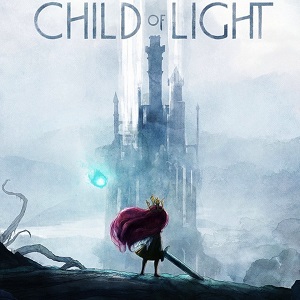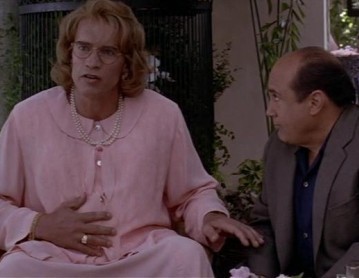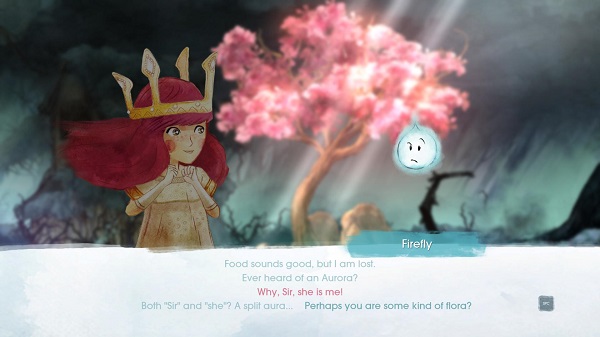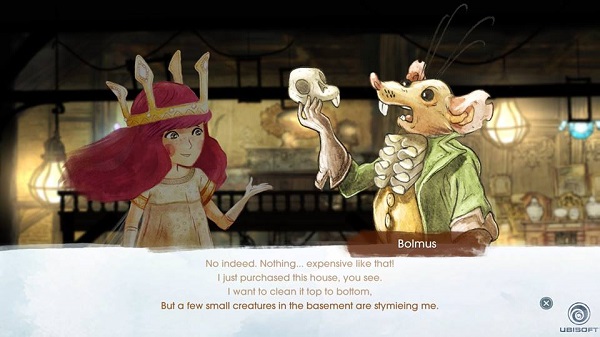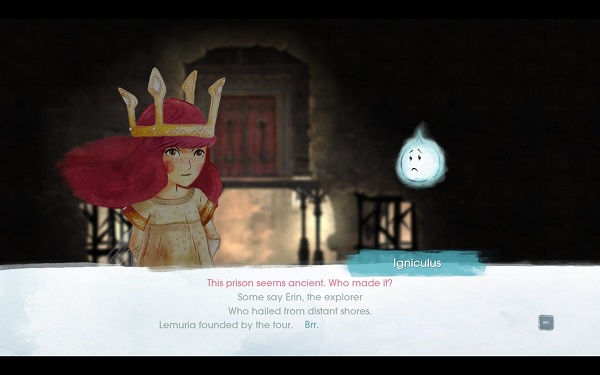SPOILER WARNING: This article talks about Child of Light’s story as a whole. If you are playing the game or want to, and don’t want to know major plot and ending information, click away now!
The fairytale is one of the most challenging literary forms from a creative standpoint. Everyone knows them, and everyone thinks they can write them, but in reality good fairytales require an extremely delicate balance between whimsy, sentimentality and darkness, to provide entertainment while imparting a certain amount of moral wisdom. It’s story alchemy of the highest order, which is probably why relatively few people in history have been able to write ones that endure.
If anything it’s even harder to do in the modern age, when adults are considered as important an audience as children. Often it leads to the mix going out of whack, resulting in stories that may be consistent in and of themselves but fail to capture that magic that makes fairytales what they are, resulting in a discomfiting sense of pretense that permeates the whole. Just as an uncool person who tries desperately to be cool makes for uncomfortable company, a try-hard fairytale is never easy to get through.
Ubisoft’s Child of Light aims to appeal to all ages, a story taking place in a mythical, magical land, putting you in the role of… an Austrian princess.
Aurora, a young girl from 1895 Austria falls into a coma, finding herself stuck the mystical realm of Lemuria in a kind of limbo-state between life and death. Lemuria has had its sun, moon and stars stolen by the evil Queen Umbra, Aurora tasked with returning the celestial bodies and finding her way back home to her father, the Duke, who is rapidly wasting away in grief for his daughter. The game suggests heavily that the Duke’s decline is being mirrored in the land, which is increasingly falling to flood the closer he inches to his own death. This idea of the two realms turning into Arthurian-style wastelands makes for a simple. clear motivation for our heroine, in keeping with fairytale tropes. However, it is turning this motivation into a clearly laid-out plot where Child of Light starts out on unsure footing, and never really rights itself.
This is partly a style issue, with dialogue, narration and objectives rendered in four-line stanza iambic rhythm verse in an ABCB pattern. Or, in English, a verse style consisting of four-line stanzas with the second and fourth lines rhyming. For an example, here’s an excerpt from Samuel Taylor Coleridge’s Rime of the Ancient Mariner, cited by the developers as an inspiration. Take this stanza, which will be undoubtedly familiar to English majors (and Iron Maiden fans):
“Water, water, everywhere,
And all the boards did shrink.
Water, water, everywhere
Nor any drop to drink.”
Child of Light‘s version reads like this:
So we can definitely say with some confidence that Coleridge didn’t work on this game. Successful narrative verse requires ironclad discipline and a skill with evocative and focused imagery, and Child of Light‘s script fails on both counts. It regularly stretches the rhyme scheme to breaking point, with numerous odd word choices that have clearly been made to make rhymes rather than lend clarity, and its metre is wildly inconsistent. Nowhere is this clearer than in the short spoken sequences that top and tail the game, read by a voice actor who tries hard but struggles with the hamfisted verse. If anything, it makes clear why the in-game text eschews voice performances. The switching of lines of dialogue mid-stanza often adds to the scattershot nature of the whole, making many of Aurora’s scenes with other characters feel like a bad Musketeer rap battle. Even worse, occasional grammar and punctuation errors crop up on occasion, which is unforgivable for a game that aspires to imitating a literary form.
The net result is a narrative that is in truth fairly simple, but remains hard to keep up with simply because the audience has to grapple with its delivery. You get the broad strokes, but detail gets lost and when the nearest you get to a quest log is a couple of lines in the menu giving you the scantest of directions to your next story checkpoint, sidequests can easily go forgotten. The game does supply backstory, but in that most hoary of videogame narrative cliches – the randomly found log, here taking the form of ‘confessions’ that can be collected and read in the menu.
But running even deeper are tonal issues that prevent the story from having the sense of awe and wonder possessed by good fairytales. Child of Light guns straight for the melancholy aspects of the genre, leaving almost every character you encounter a walking tale of woe. Aurora’s loneliness and fears for her father; a mouse doomed to unrequited love; a freshly-orphaned lizard-type girl-thing; a gnome mourning for his trapped villagers; a jester who just seems terminally miserable on general principle. Basically, everyone seems miserable, and you end up seeing the ‘crying’ animation so often it quickly loses its effect, provoking irritation rather than empathy.
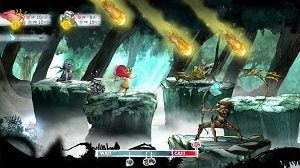 Irritation, because the writers make the classic mistake of always equating misery with profundity, and you can almost see them hammering the ‘pathos’ button with all the subtlety of a five-year-old with a noisy toy on Christmas morning. There’s scant few moments of genuine levity between these characters, and not much personality to them apart from whatever they’re sad about. In lieu of this, each character has a quirk that similarly gets quickly run into the ground. Robert the Mouse, for example, comes from a race of merchants so talks about everything in terms of financial transactions, while Rubella, one of a brother/sister jester team, constantly flubs her rhymes much to Igniculus’s annoyance. What doesn’t help about her is that she’s the first party member to be introduced, while the player is still getting their head around the game’s use of verse, which I honestly can’t work out is a sign of utter smugness on the writers’ part, a way to make the verse sound better, shining an unfortunate light on the poorness of the ‘proper’ rhymes, or a combination of the above. certainly telling is the fact that Rubella’s ‘wrong’ rhyme choices often involve clearer and more appropriate words than the rhymed ones.
Irritation, because the writers make the classic mistake of always equating misery with profundity, and you can almost see them hammering the ‘pathos’ button with all the subtlety of a five-year-old with a noisy toy on Christmas morning. There’s scant few moments of genuine levity between these characters, and not much personality to them apart from whatever they’re sad about. In lieu of this, each character has a quirk that similarly gets quickly run into the ground. Robert the Mouse, for example, comes from a race of merchants so talks about everything in terms of financial transactions, while Rubella, one of a brother/sister jester team, constantly flubs her rhymes much to Igniculus’s annoyance. What doesn’t help about her is that she’s the first party member to be introduced, while the player is still getting their head around the game’s use of verse, which I honestly can’t work out is a sign of utter smugness on the writers’ part, a way to make the verse sound better, shining an unfortunate light on the poorness of the ‘proper’ rhymes, or a combination of the above. certainly telling is the fact that Rubella’s ‘wrong’ rhyme choices often involve clearer and more appropriate words than the rhymed ones.
But for a 10-12 hour game, most of which time will be spent in combat, there’s too many characters and not enough time to develop them to any satisfying degree, making the quirks and sob stories feel like shortform designed to provoke empathy without any real understanding of why we should care about these characters. There’s hardly time to even develop any sense of cameraderie either, apart from when Aurora thinks she’s going home (she doesn’t, but we’ll get to that in a moment) and we get an extended ‘I think I’ll miss you most of all, Scarecrow’ moment that involves yet more blubbing, doubly unearned precisely because there’s been next to no time spent on character development or working on the chemistry between Aurora and her party members.
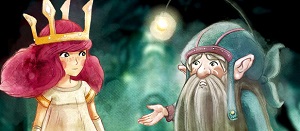 Of course, this leads to a plot twist when Norah, Aurora’s sister who has turned up to her dream-coma-dimension-quest-thing for no apparent reason, is revealed as a traitor, delivering her to Queen Umbra who turns out to be her wicked stepmother. While the game isn’t condescending enough to have this be a complete surprise to Aurora, more problematic is how Norah’s heel turn comes as an amazing shock when it was plainly, painfully obvious the second she showed up. When a character turns up with no logical reason to be in that place, and immediately adopts a negative point of view (As Norah does by expressing an instant dislike for her companions), it doesn’t exactly make it hard for the audience to join the dots. Considering that Aurora is characterized as being exceptionally resourceful and intelligent, her failure to question Norah’s appearance is simply lazy writing.
Of course, this leads to a plot twist when Norah, Aurora’s sister who has turned up to her dream-coma-dimension-quest-thing for no apparent reason, is revealed as a traitor, delivering her to Queen Umbra who turns out to be her wicked stepmother. While the game isn’t condescending enough to have this be a complete surprise to Aurora, more problematic is how Norah’s heel turn comes as an amazing shock when it was plainly, painfully obvious the second she showed up. When a character turns up with no logical reason to be in that place, and immediately adopts a negative point of view (As Norah does by expressing an instant dislike for her companions), it doesn’t exactly make it hard for the audience to join the dots. Considering that Aurora is characterized as being exceptionally resourceful and intelligent, her failure to question Norah’s appearance is simply lazy writing.
It doesn’t take a Lit professor to figure out that Aurora eventually comes through: she defeats Norah and Umbra, becoming a Princess of Light, and returns to Austria, the climax playing out in generally predictable fashion. However, a nice touch comes with the climactic moment in Aurora’s attempt to get back to her ailing father. Umbra opens a portal, allowing daughter and father to speak with each other again, then gives Aurora a choice: save Lemuria and miss her only chance to return home, or go back and leave Lemuria to its doom. Aurora, unable to abandon her friends, chooses the former and apologizes to her father, believing that he will now surely die. Her father says that he understands, summing up his pride in her with one word – “Good…” – that speaks louder than any of the numerous laboured verses the game has employed over its length. It’s a shame that such restraint couldn’t have been employed more often.
But then, with the Creative Director and writer of Far Cry 3 on board, maybe restraint was too much to ask for. Child of Light is a strange beast in that while it outwardly feels like a self-conscious attempt to get as far away from the vulgar faux-grit of Far Cry 3 as possible, the games share a vibe of grasping for profundity, but managing it less well than they think they are. Additionally, while the inhabitants of Lemuria seem to have a bit more agency than the islanders of Far Cry 3, it’s interesting to note that both games feature a privileged protagonist stranded in an alien environment, immediately going about fixing all the problems the indigenous, more primitive population somehow haven’t yet figured out for themselves.
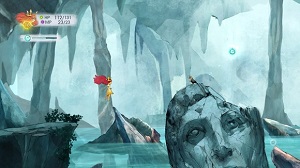 That said, although FC3‘s Jason Brody is a bit of an arrogant twit Aurora stands up much better as a character. An independent, spirited girl whose common touch gives her a relatability to match her social status. A shame then that the writers keep trying to oversell her vulnerability, reiterating time and again how much we should be feeling sorry for her rather than letting her rapidly-emerging strengths give us more reason to cheer her on. She’s at once Child of Light‘s strongest aspect and its biggest wasted opportunity, though the writers do redress the balance somewhat with her heroic decision at the game’s climax. There’s potential for a wonderful fairytale character in Aurora; she just needs a better fairytale.
That said, although FC3‘s Jason Brody is a bit of an arrogant twit Aurora stands up much better as a character. An independent, spirited girl whose common touch gives her a relatability to match her social status. A shame then that the writers keep trying to oversell her vulnerability, reiterating time and again how much we should be feeling sorry for her rather than letting her rapidly-emerging strengths give us more reason to cheer her on. She’s at once Child of Light‘s strongest aspect and its biggest wasted opportunity, though the writers do redress the balance somewhat with her heroic decision at the game’s climax. There’s potential for a wonderful fairytale character in Aurora; she just needs a better fairytale.
Ultimately, Child of Light‘s story is a mishmash of cultural influences begging to be taken seriously despite its heavy-handed construction, much like as a game it practically screams to be included in the indie arthouse crowd when it’s simply a mainstream publisher’s flirtation with themes and aesthetics attributed to that crowd. It wants to be profound, but is a mostly confusing and depressing affair, enhanced by Coeur de Pirate’s score which, while beautiful, often only succeeds in grinding the gloom home even further with its gentle strings and heavy use of cello (Though its fantastically perky JRPG-esque battle theme is admittedly great fun). Likewise, the game’s graphics are beautiful and intermittently boast inspired design, yet all too often fall back to samey gloom.
It just all feels calculated, like a story more concerned with sending adults scarpering to the internet to talk about their ‘feels’ than anything that would excite an actual child’s mind. I admit that that’s a harsh judgement, and one I’ve repeatedly wrestled with when considering my response to the game, but the more I’ve digested Child of Light the deeper my misgivings have become. It’s a game chasing a zeitgeist, and that zeitgeist has precious little to do with children but with the increased legitimacy of child-focused storytelling in general culture and of emotive storytelling in games. Child of Light may tick all adequate boxes, but struggles with its own identity.
